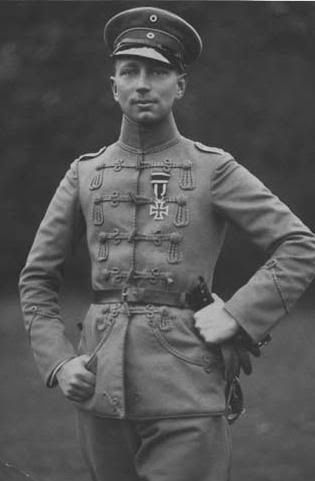Prince Joachim
From Kaiserreich
|
Joachim Franz Humbert von Hohenzollern (born in Potsdam, Germany, on December, 17 1890) is a Prince of the House of Hohenzollern. The sixth and youngest son of Kaiser Wilhelm II, he was proclaimed King of Ireland for three months from July, 11 to October, 24 1922 under the name of Brian III, before the monarchy was abolished by Michael Collins. He disappeared from political life after his tentative of suicide in 1923.
Contents |
Biography
Early life
Prince Joachim was born in Potsdam, the sixth and youngest son of the Kaiser Wilhelm II and his first wife, Empress Augusta Viktoria. Educated, along with his brothers, in the Prinzenhaus, he joined in 1911, after his military formation, the 1. Garderegiment zu Fuß (1st Footguard Regiment). During the Weltkrieg, he was wounded at the Battle of the Masurian Lakes. He married in 1916 Princess Marie Auguste of Anhalt, but their wedding was however not so happy.
King of Ireland
During the 1916 Easter Rising in Dublin, Ireland, some Republican leaders considered to give the throne of Ireland to Prince Joachim, one of the Kaiser's sons, in order to be in favour of the German Empire. In the aftermath of the Weltkrieg, then Ireland felt in open rebellion against the declining United Kingdom, then ambassador in Dublin Franz von Papen further propagated this idea in the minds of Irish leaders such as Michael Collins and Eoin o'Duffy. When the United Kingdom recognized the independence of Ireland on July 1922, after it was clear that Germany was supplying the Irish Republican Army, the new Taoiseach Michael Collins officially proclaimed the Kingdom of Ireland, calling to Prince Joachim of Prussia to rule the newly independent country.
Prince Joachim, whose marriage was declining, accepted the offer with enthusiasm, claiming the regnal name of Brian III and announcing his decision to convert to Catholicism. However, his travel to Ireland was constantly postponed, due to German leaders' reluctance to further provocate the British and the fear of a British attack on the Prince. After more than three months of wait, Collins, wanting to conclude a bargain with the anti-German wing of the IRA, got rid of the Germans and abolished the monarchy in Ireland, thus aborting the dreams of Prince Joachim.
Depression
There are at least two reasons for the Prince's depression in 1923: his unhappy marriage or the failure of his expectations for Ireland. Prince Joachim almost progressively disappeared from public life and attempted to take his own life by gunshot on July 18, 1923. He was hopefully saved by one of his bodyguards. However, the Imperial Family and the then military government of Paul von Hindenburg and Erich von Ludendorff tried to hush up the scandal, but the tentative of suicide was finally revealed by Princess Marie Auguste herself, and later by the Prince's oldest brother, Kronprinz Wilhelm. This event contributed to the fall of the Hindenburg-Ludendorff dictatorship and somewhat damaged the image of the Hohenzollern dynasty who refused to support one of its Princes. Prince Joachim now lives retired from political life, in a secret residence.
Family
Prince Joachim married on March, 11 1916 with Princess Marie Auguste Von Anhalt-Dessau (born on June, 10 1898), daughter of Prince Eduard Georg Wilhelm of Anhalt. Together, they had a son, Karl Franz Josef Wilhelm Friedrich Eduard, born on December, 15 1916. Some sources affirmed that the cause of Prince's tentative of suicide was his unhappy marriage, a point that the Princess contests. It's however understandable that, after the failure of his Irish experience, the Prince's relation with his wife became more strained.

